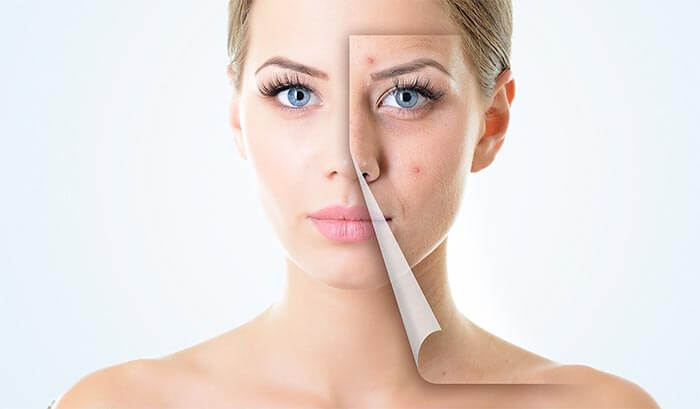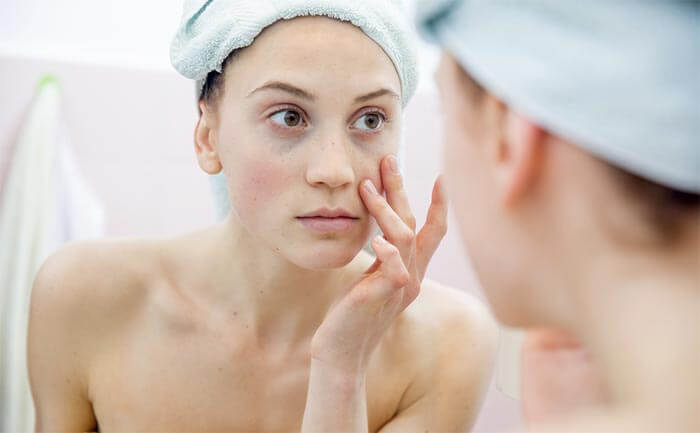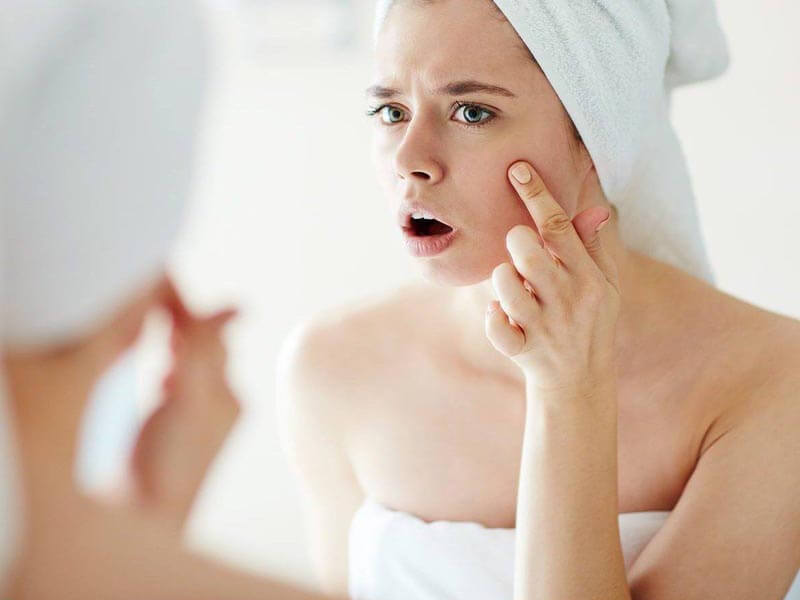Acne vulgaris is one of the most common skin diseases, which mainly affects young people. Studies show that acne vulgaris affects as much as 80% of people under 30 years of age. The disease may have a mild course, but in 15% of cases it occurs in a serious inflammatory form. Unfortunately, acne vulgaris can leave scars and discolourations. The lesions of acne vulgaris are mainly found on the face in the form of inflammatory efflorescences (e.g. closed and open blackheads) and inflammatory (e.g. pustules, cysts, lumps). How do you recognise acne vulgaris? First of all, it is manifested by excessive sebum secretion, especially in the forehead, nose and chin area. As a consequence of excessive sebum production, blackheads appear.
Table of content
- Acne – causes of acne
- What is common acne?
- The figure of acne vulgaris
- Types of acne vulgaris
- How can we combat acne vulgar acne?
- Effects of treatment of acne vulgaris
Acne – causes of acne
Genetic factors – the individual susceptibility to excessive sebum production and keratinisation of the hair follicle mouths. It is also worth noting that acne vulgaris affects children and adolescents, whose families suffered from acne much more often.
Hormonal changes of the puberty period – increased amount of androgen hormones leads into stimulation of sebum production as well as enlargement of sebaceous glands.
Sebaceous glands and excessive sebum production. Sebum production is controlled by hormones such as androgens or progesterone, whose increased activity leads to sebum production, increasing the risk of acne.

The process of comedogenesis – this leads to difficult sebum excretion from the tallow glands and slow expansion of the outlet pipes.
Infectious agents.
Dietary factors.
Stress – may intensify sebum production and thus acne changes.
Toxic substances – contact with chlorine or certain oils increases the risk of acne.
Medicines – acne can occur after taking steroids or barbiturates.
What is common acne?
It should be mentioned at the outset that there are two basic types of blackheads, open and closed. In the case of open type blackheads, there is a small hole in the centre of the blackheads, through which sebum and horn mass escapes. In the changes, melanin (brown skin pigment) accumulates, keratin is oxidised, which builds up the keratinized epidermis. As a result, it leads to the formation of blackheads, which are characterized by a dark shade. Closed-type blackheads have the form of white lesions, which form in deeper layers of the skin. It is the dead cells of the epidermis that gather in the mouth of sebaceous glands, blocking them and preventing the escape of sebum.
The figure of acne vulgaris
- Moderate – lumps appear which is inflammatory efflorescence. They take the form of convex red lesions, which transform into purulent pustules. They, in turn, contribute to additional irritation leading to the spread of inflammation in the dermis.
- Severe – skin lesions definitely intensify, leading to the appearance of cysts and various types of nodules on the skin. Unfortunately, this form of acne requires the help of a specialist in order to avoid complications in the form of scars.
Types of acne vulgaris
Acne vulgaris can be divided into several categories which depend on the type of skin lesions, the type of symptoms or factors causing it.
Acne can be distinguished by the type of skin lesions:
- blackheads – only blackheads, closed and open,
- Pelvic-pipes – blackheads are joined to blackheads by lumps and pustules,
- nodular-cystic – deep inflammatory tumors and tumors with accumulated purulent content appear.

Acne stands out due to the type of symptoms:
- youthful – with blackheads and lumps,
- pushers – with purple cysts that leave scars,
- concentrated with deep infiltrates, purulent cysts and large blackheads,
- scarring – with scars forming within the acne lesions,
- with a hard run.
Acne stands out due to the factors causing the changes:
- occupational, for employees after contact, e.g. with chlorine, oils,
- medical, caused by steroids, vitamin B12, iodine, barbiturates,
- cosmetic, as a result of abuse of cosmetics blocking sebaceous and sweat glands,
- infants – associated with the use of infant skin care products.
How can we combat acne vulgar acne?
It turns out to be an excellent solution to take advantage of the advice of a specialist who will help us in a precise diagnosis and recommend products that will help to eliminate the causes of acne formation. It is the specialist who will choose the products with anti-acid, antibacterial, anti-inflammatory or anti-hypodermic effect. We must be aware of the need for several months’ or even several years’ treatment. In the case of a mild form of acne vulgaris, a local effect is sufficient.
When we start treating acne vulgaris, we should focus on the use of anti-acid, antibacterial, keratolytic and anti-inflammatory drugs. In mild acne, the use of products with a local effect, e.g. ointments, salicylic acids in a concentration of 2-3 per cent and substances with the addition of thymol or menthol, brings benefits. Positive effects are also brought about by topical agents, which contain vitamins A, benzoyl peroxide and erythromycin. In case of more severe forms of acne, general treatment is applied, which requires the use of antibiotics containing vitamin A derivative, isotretinoin. Acne tablets, which help to combat their negative effects, are very popular.
Effects of treatment of acne vulgaris
The first effects of treatment may appear after a different period of time, as this is related to the severity of the disease. In the case of acne with a mild course, it is sufficient to perform appropriately selected cosmetic treatments in combination with a balanced diet and proper home care. However, a more severe form of acne requires consultation with a dermatologist who will direct us to pharmacological treatment.
There is no doubt that the pace of treatment is influenced by the cause of acne vulgaris. This is all the more important because in the case of acne under stress or hormonal changes, the disease can be recurrent.




